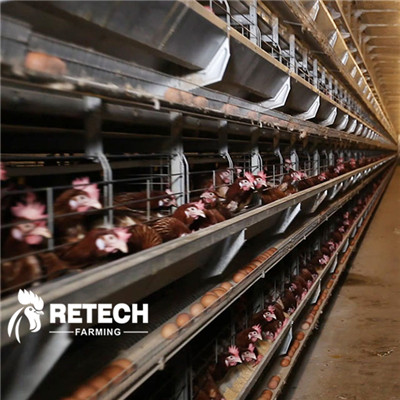Mezinahiyahêkbandorê li ser bihayê hêkan dike. Ger bihayê firotanê li gorî hejmarê were hesibandin, hêkên piçûk ji hêla lêçûnê ve maqûltir in; ger li gorî giraniyê werin firotin, firotina hêkên mezin hêsan e, lê rêjeya zirarê ya hêkên mezin bilind e.
Ji ber vê yekê faktorên ku bandorê li giraniya hêkan dikin çi ne? Li vir çend rê hene ku hûn giraniya hêkan birêkûpêk bikin da ku daxwaza bazarê bicîh bînin.
Kîjan faktor bandorê li mezinahiya hêkê dikin? Faktorên sereke yên ku bandorê li giraniya hêkê dikin ev in:
1. Genetîka nijadê
2. Adetên fîzyolojîk
3. Faktorên xurekî
4. Jîngeh, Rêveberî
5. Nexweşî û tenduristî
1. Genetîka nijadê
Faktora sereke ya ku bandorê li giraniya hêkan dike nijad e. Cureyên cuda yên mirîşkên hêkdanê giraniya hêkên cuda hildiberînin û cotkar dikarin ji bo pêkanîna daxwaza bazarê cureyên cuda hilbijêrin.
2. Adetên fizîkî
1) Temen di dema jidayikbûna yekem de
Bi gelemperî, roja hêkdanê çiqas zûtir be, giraniya hêkê di tevahiya jiyanê de ewqas kêmtir dibe. Ger ev rewş ji berê ve neyê berçavgirtin, rêyek tune ku paşê were telafîkirin. Lêkolînan nîşan daye ku ji bo her hefteyek derengmayîna destpêkirina hilberînê giraniya hêkê ya navînî 1 gram zêde dibe. Bê guman, destpêkirina hilberînê nikare bêdawî were paşxistin. Hilberîna pir dereng dê veberhênanê zêdetir bike.
2) Giraniya destpêkê
Duyemîn faktora herî mezin a ku bandorê li giraniya hêkan dike giraniya berî çêkirina yekem e, ku giraniya navînî ya hêkan di qonaxên destpêkê yên çêkirina hêkan de û heta di tevahiya çerxa çêkirina hêkan de jî diyar dike.
Faktorên sereke yên ku mezinahiya hêkê diyar dikin, mezinahiya zerikê û qalindahiya sipiya hêkê ya ji hêkdankê derdikeve ne, û mezinahiya zerikê bi giranî ji hêla giraniya mirîşka hêkdank û kapasîteya xebata organên hundurîn ve bandor dibe, ji ber vê yekê giraniya di gihîştina zayendî de dikare were destnîşankirin. Tê fêmkirin ku ew faktora sereke ye di destnîşankirina giraniya hêkê de.
3) Temenê hêkdanê
Her ku mirîşkên hêkdanê ciwantir bin, hêkên wan jî biçûktir dibin. Her ku temenê mirîşkên hêkdanê zêde dibe, giraniya hêkên ku ew dikin jî zêde dibe.
3. Faktorên xurekî
1) Enerjî
Enerjî faktora sereke ya xurekî ye ku giraniya hêkê kontrol dike, û enerjî di qonaxa destpêkê ya hêkdanê de bandorek mezintir li ser giraniya hêkê dike ji proteînê. Zêdekirina asta enerjiyê ya rast di dema mezinbûnê û qonaxa destpêkê ya hêkdanê de dikare giraniya laş û rezervên enerjiya fîzîkî di destpêka hêkdanê de têrtir bike, û bi vî rengî dikare giraniya hêkê di qonaxa destpêkê ya hêkdanê de zêde bike.
2) Proteîn
Asta proteînê di parêzê de bandorê li mezinahî û giraniya hêkan dike. Kêmbûna proteînê di parêzê de dibe sedema hêkên piçûktir. Ger mirîşk xwedî giraniya laşê têr bin û hêkên piçûk bikin, rêjeya proteînê di xwarinê de dikare were zêdekirin.
Di qonaxa destpêkê yadanîna hêkan, sûdmend e ku enerjî û asîdên amînî bi awayekî guncaw zêde bibin da ku rezervên enerjiya fîzîkî û bilindahiya lûtkeyê baştir bibin, û nayê pêşniyar kirin ku proteîn pir zêde be.
3) Asîdên amînî
Ji bo mirîşkên hêkdanê yên berhemdar, asta metionînê dikare bandorek girîng li ser giraniya hêkan bike. Li gorî pêşgotina enerjiya têr, giraniya hêkan bi zêdebûna asta metionînê ya parêzê re bi awayekî xêzikî zêde dibe. Naveroka nebaş û rêjeya nehevseng a yek an çend asîdên amînî dê bibe sedema kêmbûna hilberîna hêkan û giraniya hêkan. Kêmkirina bêserûber a mîqdara asîdên amînî yên lêzêdekirî dê di heman demê de bandorê li hilberîna hêkan û giraniya hêkan bike. Hêjayî gotinê ye ku giraniya laş faktorek sereke ye ku bandorê li giraniya hêkan di qonaxa destpêkê ya hêkdanê de dike, di heman demê de proteîn û asîdên amînî bandorek hindik li ser giraniya hêkan di qonaxa destpêkê ya hêkdanê de dikin.
4) Hin xurek
Kêmasiya vîtamîna B, kolîn û betaînê di xwarinê de dê rê li ber bikaranîna metionînê bigire, bi vî awayî hewcedariya mirîşkên hêkdanê ya bi metionînê zêde dike. Ger di vê demê de metionîn têrê neke, ew ê bandorê li giraniya hêkê jî bike.
5) Asîdên rûn ên netevahî
Dagirtina xwarinê dikare tama xwarinê baştir bike û wergirtina xwarinê zêde bike. Zêdekirina asîdên rûn ên netêrbûyî dikare giraniya hêk û giraniya laşê mirîşkên hêkdar zêde bike. Rûnê soyayê rûnê herî berbiçav e ji bo zêdekirina giraniya hêkan. Di demsala germahiya bilind a havînê de, zêdekirina 1,5-2% rûn li parêzê dikare rêjeya hilberîna hêk û giraniya hêkan bi girîngî baştir bike.
Hêjayî gotinê ye ku heke kêmbûna asîda rûn hebe, kezeb divê nîşasta bikar bîne da ku wê sentez bike, ji ber vê yekê heke hûn bikaribin cûrbecûr asîdên rûn peyda bikin ku bi xwarina mirîşkên hêkdankê re li hev bikin, ev ê rêjeya hilberîna hêkan û giraniya hêkan zêde bike. Ew ji bo parastina fonksiyona kezebê û tenduristiya kezebê çêtir e.
6) Xwarina xwarinê
Bi wê texmînê ku rêjeya xurekê di xwarinê de nisbeten sabît û aram e, her ku mirîşkên hêkdanê xwarina wan zêdetir be, hêk jî mezintir dibin, û her ku xwarina wan kêmtir be, hêk jî biçûktir dibin.
4 Jîngeh û Rêveberî
1) Germahiya hawîrdorê
Germahî bandora herî rasterast li ser giraniya hêkan dike. Bi gelemperî, giraniya hêkan di havînê de piçûktir û di zivistanê de mezintir e. Ger germahiya di xanîya mirîşkan de ji 27°C derbas bibe, giraniya hêkan ji bo her zêdebûna 1°C dê %0,8 kêm bibe. Ger tedbîr bi rêkûpêk neyên girtin, ne tenê giraniya hêkan dê bandor bibe, lê rêjeya hilberîna hêkan jî dê bi rêjeyên cûda kêm bibe; bê guman, ger germahî pir kêm be, ew ê bibe sedema nexweşiyên metabolîk jî, dema ku germahî ji 10°C kêmtir be, ji ber zêdebûna hewcedariyên lênêrînê yên mirîşkên hêkdanînê bixwe, proteîn dê ji ber kêmbûna enerjiyê bibe bermayî an jî barek, û giraniya hêkan jî dê kêm bibe. Ger hûn dixwazin giraniya hêkek maqûl an hêkek mezin bistînin, divê hûn di xwarin û rêveberiya demsalî ya mirîşkên hêkdanînê de karekî baş bikin, û germahiya xanîya mirîşkan di 19-23°C de kontrol bikin.
2) Bandora ronahiyê
Temenê gihîştina zayendî ya mirîşkên hêkdanê yên ku di demsalên cûda de têne çandin cûda ye. Çûkên ku ji Cotmehê heta Sibatê yên sala duyemîn têne anîn, ji ber ku di qonaxa paşîn a mezinbûnê de hêdî hêdî dema rojê dirêj dibe, meyla wan heye ku zû bizewicin; çêlikên ku ji Nîsanê heta Tebaxê têne anîn di qonaxa paşîn a mezinbûnê de rojê dibînin. Dem hêdî hêdî kurt dibe, û keriyên heywanan dikarin destpêkirina hilberînê bi hêsanî dereng bixin. Destpêkirina keriyek pir zû an pir dereng dikare bandorek cidî li ser aboriyê bike.
5 Nexweşî û tenduristî
1) Mirîşkên ku asta antîkorên wan kêm e, bergiriya wan kêm e, streseke ji nişka ve an berdewam, û hin demên vegirtina nexweşiyan an encamên wan dê bibin sedema giraniya hêkê ya ne rêkûpêk;
2) Ava vexwarinê ya kêm û qalîteya nebaş dê bandorê li giraniya hêkan bike.
3) Dermankirina nerast dê giraniya hêkê jî kêm bike.
4) Tenduristiya rêça gastrointestinal û kezebê jî dê bandorê li mezinahiya hêkê bike. Ev faktorên nexweş dê bandorê li helandin, mijandin û veguhestina xurdemeniyan bikin, di encamê de kêmbûna nerasterast a xurdemeniyan çêdibe, û di encamê de giraniya hêkê ji hedefê dûr dikeve.
Ez çawa dikarim baştir bikimgiraniya hêkanpiştî ku cûrbecûr hat hilbijartin?
1. Bala xwe bidin xwarin û birêvebirina zû ya mirîşkên hêkdankê, da ku giraniya mirîşkan di her qonaxê de ji giraniya standard derbas bibe, hewl bidin ku ji sînorê jorîn ê rêza giraniya pêşniyarkirî ≥ derbas bibin, û pêşveçûna baş a organan, tevî pergala hilberandinê, misoger bikin. girîng e.
2. Têrkirina pêdiviyên enerjiyê û sererastkirina naveroka proteîn û asîdên amînî yên xwarinê li gorî pêdiviyên bazarê dikare giraniya hêkê zêde bike.
3. Zêdekirina toza rûnê emulsîfîkirî bi asîda rûnê ya hevseng re dikare giraniya hêkê zêde bike.
4. Bernameya ronahîkirinê kontrol bike û temenê mirîşkên hêkdanê biguherîne da ku giraniya hêkên navînî were sererastkirin.
5. Bala xwe bidin vexwarina xwarinê û mezinahiya perçeyên perçiqandina xwarinê rast bikin da ku vexwarina xwarinê zêde bikin, pêşî li ber îsrafa xwarinê bigirin û giraniya hêkê zêde bikin.
6. Dema ku germahî bilind be, sererastkirina germahiya di nav malê de ji bo xwarina mirîşkên hêkdankê guncaw e û dikare zêde bike.giraniya hêkan.
7. Mîkotoksînan kontrol bikin, dermanên nezanistî ji holê rakin, tenduristiya kezeb û rûvî biparêzin, û ji her xurekek bi tevahî sûd werbigirin.
Dema weşandinê: 29 Hezîran-2022











